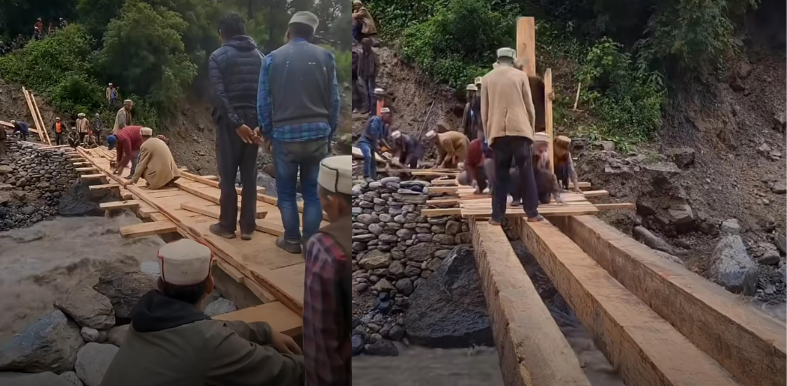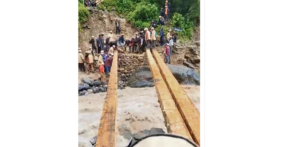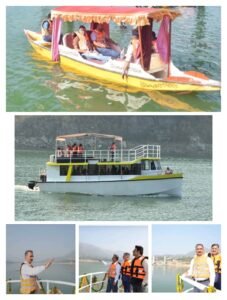After govt’s slow response, Malana villagers themselves build bridge on gushing Kullu stream

Malana considered to be world’s oldest democracy as all residents participate in its administration
MANDI: Following the Himachal Pradesh government’s “sluggish” response to the recent disaster caused by flashflood, the residents of remote Malana village in Kullu district took it upon themselves to construct a temporary wooden bridge over the gushing Malana rivulet.
The villagers worked collectively and completed the construction of the bridge within a single day. Using ropes, they hauled large logs to the stream, built embankments and laid wooden planks on a base of three horizontally placed logs. This newly constructed bridge ensures that villagers can now cross the stream without difficulty.
The village had been cut off after the original bridge was washed away by flashfloods. On the night of July 31, a cloudburst caused the Malana Hydel Project-1 barrage to break, resulting in extensive damage to the low-lying villages of Baladhi and Chowki.
Meanwhile, the administration is constructing a temporary ropeway for Baladhi village. Chief Parliamentary Secretary Sunder Singh Thakur announced that Chief Minister Sukhvinder Singh Sukhu had approved the installation of three ropeways in Malana, Baladhi and Chowki villages.

However, upholding their democratic legacy, the villagers of Malana swiftly constructed the bridge just five days after the disaster.
Malana is considered by some to be the world’s oldest democracy because all residents participate in its administration. The village has its own laws, traditions and governance systems, and its people, known as Malanis, have preserved their customs and beliefs for centuries. It is also infamous for top-quality marijuana.
Similarly, in the Manikaran Valley, both bridges connecting Tosh village to the local market were swept away due to flooding in the Tosh stream following a cloudburst on the night of July 29. Villagers faced significant challenges crossing the stream to access the market. In response, the villagers independently built a temporary wooden bridge to restore access.
The disaster severely damaged the road from Jari village to the nearest motorable point near Malana in five places, posing a continuing challenge for the administration to provide aid. On Sunday, a team from the district administration, with the help of villagers, rescued several tourists stranded in the village. The police also rescued two tourists traveling to Malana via the Jari-Chowki trek route.
Many footbridges damaged in last July’s floods remain unrepaired, with temporary ropeways still in use in these areas. Despite this, the residents of Malana and Tosh did not wait for government intervention. They promptly addressed their problems, showcasing remarkable resilience and self-reliance in the aftermath of the disaster.




